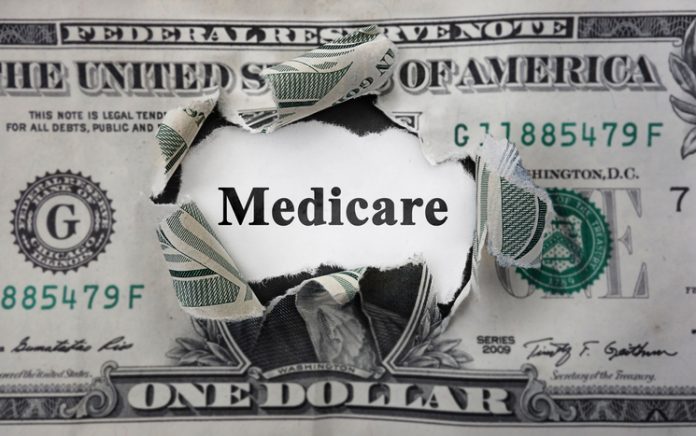Instead of expanding Medicare to cover more people, Congress would be better off trying to fix Medicare’s solvency problems, says Terry Nager, the principal author and founder of “Plan for America (PFA).” Nager, a certified financial planner, proposes a complete reorientation of Medicare as well as Social Security to allow a national, private “opt-out” under which individuals could save for retirement and buy health insurance through individual accounts. Following is an edited transcript of Health Care News’s Managing Editor AnneMarie Schieber’s interview with Nager on The Heartland Daily Podcast.
Health Care News: In a nutshell, what is the “Plan for America”?
Nager: Plan for America is a comprehensive solution to the suffocating national debt caused in large part by the financial pressure from our entitlement programs, Social Security and Medicare. PFA provides high-quality health care for every American and is truly affordable, while at the same time it deals with the unfunded liabilities [of these programs]. PFA also puts the nation on track to eliminate federal deficits and debt. PFA is a voluntary, private market solution that is established by contract and less subject to the whims of politicians.
Health Care News: The idea of privatizing Medicare and Social Security failed to gain traction in the past. Why would PFA be any different?
Nager: PFA’s privatization of health care is very different from previous efforts. First, the benefits are greater than anything previously offered: no out-of-pocket cost for co-pays or deductibles aside from the health savings account (HSA) which is included in the premium. The insurance can be used for any health care need including nursing home care. There would be interest-free loans for those who cannot afford the premiums and no ultimate cap on the benefits. Second, the ultimate guarantee of funding is provided by the contractual obligation of the federal government to back the bonds necessary for near and intermediate-term benefits.
Health Care News: What if only a small percentage of Americans want to participate? Would that reduce the liabilities enough to make it worth the trouble?
Nager: If only a small percentage of the American public participates, it would be due to a lack of information as to the benefits [of PFA]. The health care benefits are greater than Medicaid, Medicare, or Obamacare, and all the premiums are tax-deductible. The retirement plan funded by the 15.3 percent—which is now the payroll tax—would be placed into a trust invested in a total market index fund that is all tax-deductible and pays out at retirement, tax-free. PFA provides government guarantees for safety and stock market returns for growth.
Once the benefits are understood, there would be a rush to participate. In the interim, the benefits to the individuals and the government will be proportionate to their involvement, but even a small percent of the population would be a large amount of money and would be workable.
Health Care News: Who would decide what health plans would qualify for PFA?
Nager: The individual participant would decide which company to choose. The board of the For America Security Trust (FAST)—the trust formed to hold the participant’s retirement funds and administer PFA—would ascertain the financial stability of the insurance companies and require them to offer comprehensive coverage. But each of the plans could offer its own unique bells and whistles. All health care policies approved by the FAST board would be offered throughout the country and usable in every state.
Health Care News: Would there be minimum coverage requirements like Obamacare that could make the plans too costly? In other words, would insurers shrink their networks and squeeze providers to make it work?
Nager: The minimum coverage is full comprehensive coverage and would be the standard. Everyone must have full coverage because, under PFA, no one (meaning the taxpayer) would have to pay for anyone else’s health care. Affordability is the key to the coverage and is provided through interest-free loans to anyone earning under $40,000 annually (100 percent of the premium and phasing out at $70,000).
These loans do not have to be repaid with out-of-pocket funds. Repayment is made through excess returns on the borrower’s FAST account. Also, a life insurance policy is issued in the amount of a loan to guarantee repayment. These life insurance policies would be guaranteed issue, so that health status, age, or occupation would be irrelevant. The fact that these premiums are paid through the loan provision makes these health care policies virtually lapse-proof.
Health Care News: One problem with health insurance today is consumers have become alienated from the true costs. Overutilization can drive up costs. Could that happen with the PFA?
Nager: PFA deals with rising health care costs by providing incentives to policyholders to conserve their insurance dollars.
The annual $1,200 HSA is part of the insurance premium. The HSA would cover co-pays and deductibles and cannot exceed $1,200. Whatever goes unused in the HSA can be withdrawn tax-free as the HSA is funded with tax-deductible dollars.
Each standard policy would have a $1,000,000 cap on benefits. If that were exceeded, then the policyholders’ own assets would be at risk. However, if the insured did not have the funds to pay for the extra health expense, then an interest-free loan would be issued up to the amount required with no cap and paired with life insurance. This would incentivize participants to conserve their $1,000,000 coverage.
Internet info:
“How the ‘Plan for America’ Can Solve the Stability Problems Facing Social Security and Medicare,” The Heartland Daily Podcast, December 7, 2021: https://www.heartland.org/multimedia/podcasts/how-the-plan-for-america-can-solve-the-stability-problems-facing-social-security-and-medicare




















